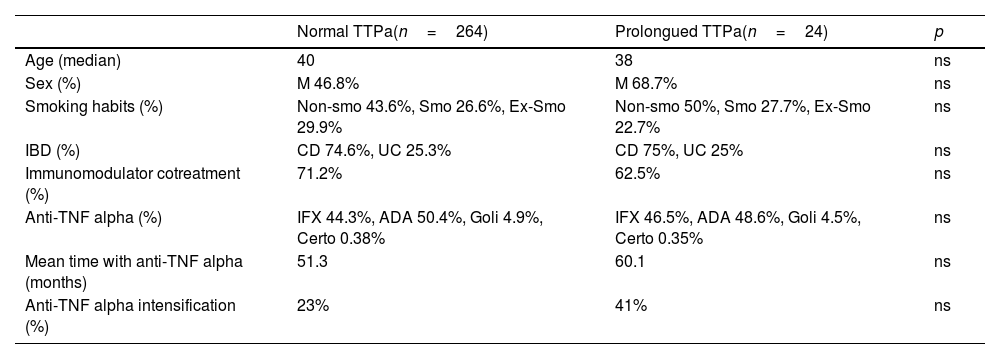Ant-iTNF treatment has been broadly linked with autoantibodies and autoimmune disorders development. After the clinical observation of aPTT (activated partial thromboplastin clotting time) prolongation in our cohort of IBD patients treated with anti-TNF, we sought to determine the presence of antiphospolipid antibodies in our population, along with antiphospholipid syndrome (APS) occurrence.
MethodsWe included in the study 289 patients treated with anti-TNFα antibodies.
ResultsTwenty four of 289 patients presented a prolonged aPPT (8.3%) after starting anti-TNF treatment. We found antiphospholipid antibodies in 70.8% (17/24) of patients with aPTT prolongation. No major thrombotic events were reported although one patient met criteria for APS because of persistent antiphospolipid antibodies and two miscarriages. Another patient was diagnosed with lupus-like syndrome.
ConclusionAnti-TNF treatment is associated with the induction of various antibodies, among them, antiphospholipid antibodies. However, a very low number of patients develop APS. Testing for antiphospholipid antibodies patients with prolonged aPPT could identify those at risk and lead to individualized treatment. Additional prospective studies are necessary to acquire more information.
El tratamiento con anti-TNF se ha relacionado ampliamente con el desarrollo de autoanticuerpos y enfermedades autoinmunes. Tras la observación clínica de prolongación del tiempo de tromboplastina parcial activada (aPTT) en nuestra cohorte de pacientes con enfermedad inflamatoria intestinal tratados con anti-TNF, buscamos determinar la presencia de anticuerpos antifosfolípido en nuestra población, junto con la ocurrencia del síndrome antifosfolípido (SAF).
MétodosSe incluyeron en el estudio 289 pacientes tratados con anticuerpos anti-TNFα.
ResultadosDe los 289 pacientes, 24 presentaron un aPTT prolongado (8,3%) después de iniciar el tratamiento con anti-TNF. Encontramos anticuerpos antifosfolípido en el 70,8% (17/24) de los pacientes con prolongación del aPTT. No hubo episodios trombóticos mayores, aunque una paciente cumplió los criterios de SAF debido a la presencia persistente de anticuerpos antifosfolípidos y a 2 abortos espontáneos. Otro paciente fue diagnosticado con síndrome parecido al lupus.
ConclusionesEl tratamiento con anti-TNF se asocia a la inducción de diversos anticuerpos, entre ellos los antifosfolípido. Sin embargo, un número muy bajo de pacientes desarrolla SAF. La evaluación de anticuerpos antifosfolípido en pacientes con aPTT prolongado podría identificar a aquellos en riesgo y conducir a un tratamiento individualizado. Se necesitan estudios prospectivos adicionales para obtener más información.
Artículo
Comprando el artículo el PDF del mismo podrá ser descargado
Precio 19,34 €
Comprar ahora









